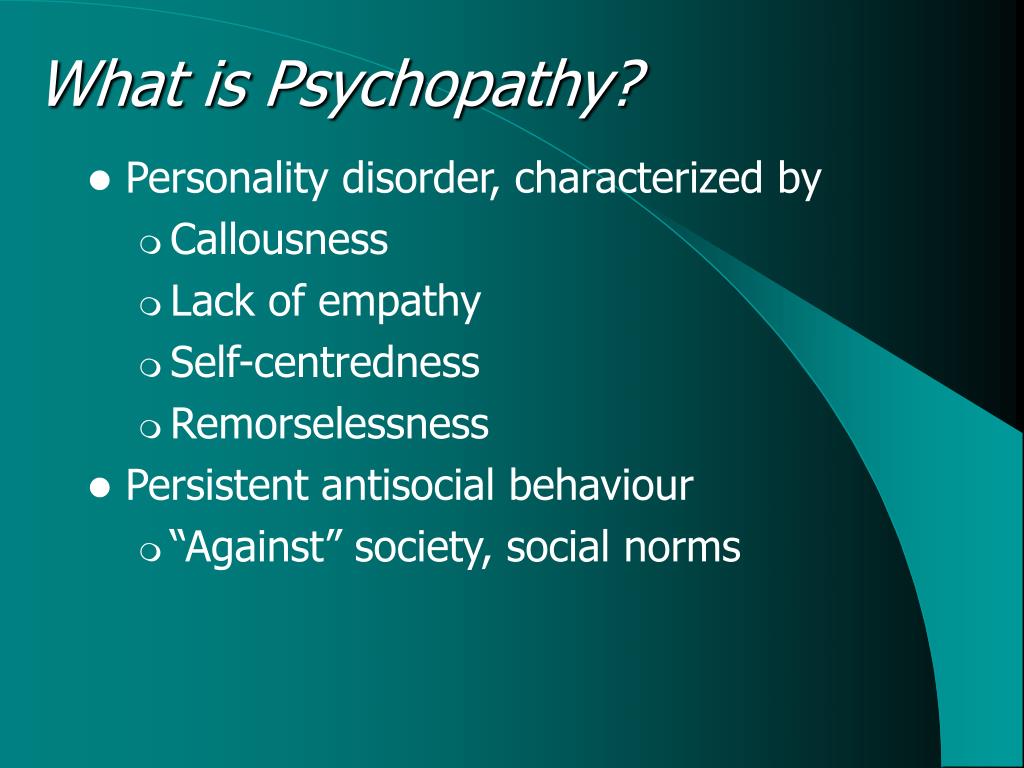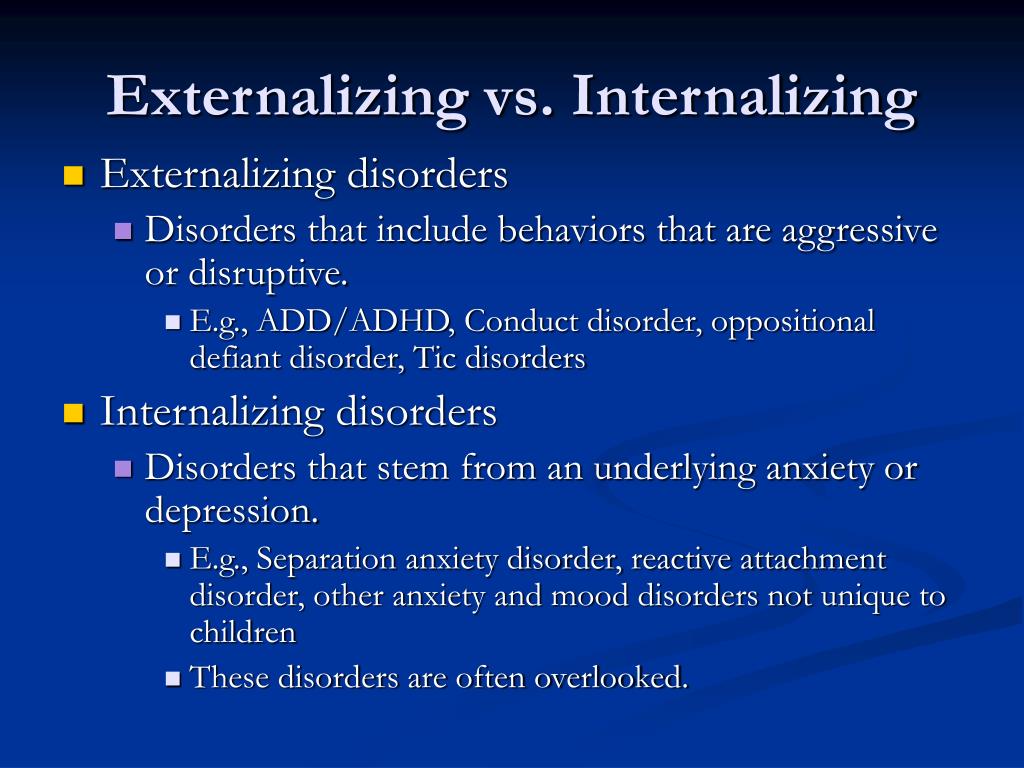What is lack of empathy
Lack of Empathy: What it Means and How to Deal
Empathy is a fundamental part of building meaningful social connections. For some people, though, developing it may be a challenge.
Understanding another person’s feelings and experiences, even if opposite to ours, may allow us to respond in a supportive way and regulate our own emotions.
What happens when you don’t feel it? Is it possible to lack empathy altogether? And if so, is this a sign of a mental health condition? There are many possible answers to these questions, even though this is still an evolving area of research.
In general, empathy is the ability to understand or sense another person’s perspective, feelings, needs, or intentions, even when you don’t share the same circumstances. It can sometimes involve acting on that understanding, including offering help.
But empathy doesn’t always lead to action. It may depend on the type of empathy you’ve developed.
According to psychologists and researchers Paul Ekman and Daniel Goleman, there are three main types of empathy:
1.
This type of empathy is an intellectual understanding of someone else’s feelings. It’s the ability to consider other perspectives without sensing or experiencing them yourself.
For example, if a colleague loses their job, you may recognize what emotions they could be feeling. You could also understand how their emotions might affect their behavior. This doesn’t mean you experience distress yourself.
2. Affective or ‘emotional’ empathy
People who have emotional empathy tend to feel another person’s emotions. Although not always the case, this may also include physical sensations consistent with such emotion.
For example, if you see someone under great distress after losing a loved one, you feel sad yourself and could experience chest or stomach pain while sensing that emotion in the other person.
3. Compassionate empathy or ‘empathetic concern’
Compassionate empathy is a combination of cognitive and emotional empathy.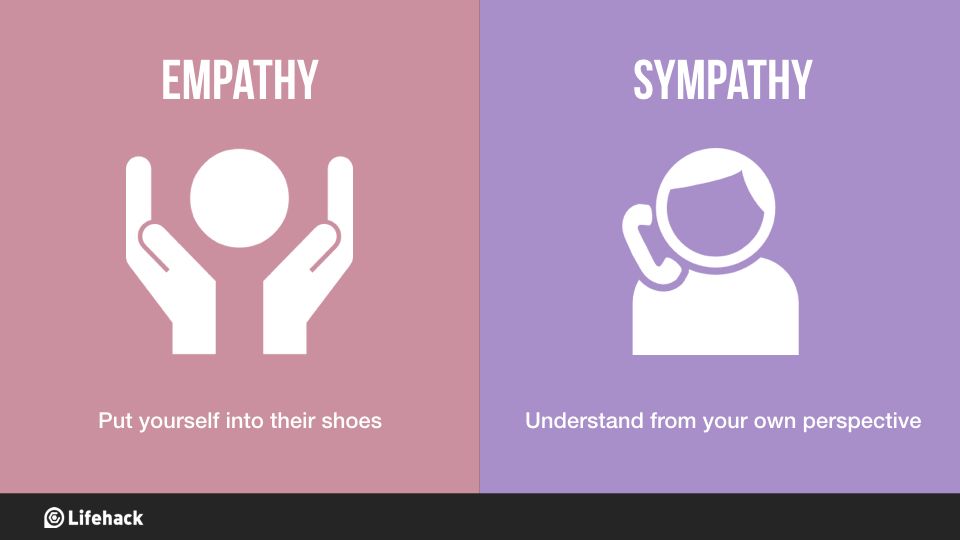 You recognize and understand another person’s emotions and also feel them.
You recognize and understand another person’s emotions and also feel them.
Taking on another person’s challenges and hurt may end up taking a toll on you. This is why some people may not develop this type of empathy.
However, relating to other people’s suffering may also lead you to consider helping. And research suggests that when you do help, your body produces more dopamine — a “feel-good” hormone. This then leads and motivates you to continue acting on your cognitive and emotional empathy.
Examples of compassionate empathy include stopping your car to help if you see someone fall or donating to a cause after a natural disaster.
Can you have one type of empathy only?
Not everyone develops compassionate empathy, and there are also different levels of emotional or cognitive empathy.
For example, you could feel sad that your partner is experiencing a challenge (emotional empathy). It hurts you to see them hurt.
Yet, you may not really understand why they feel this way.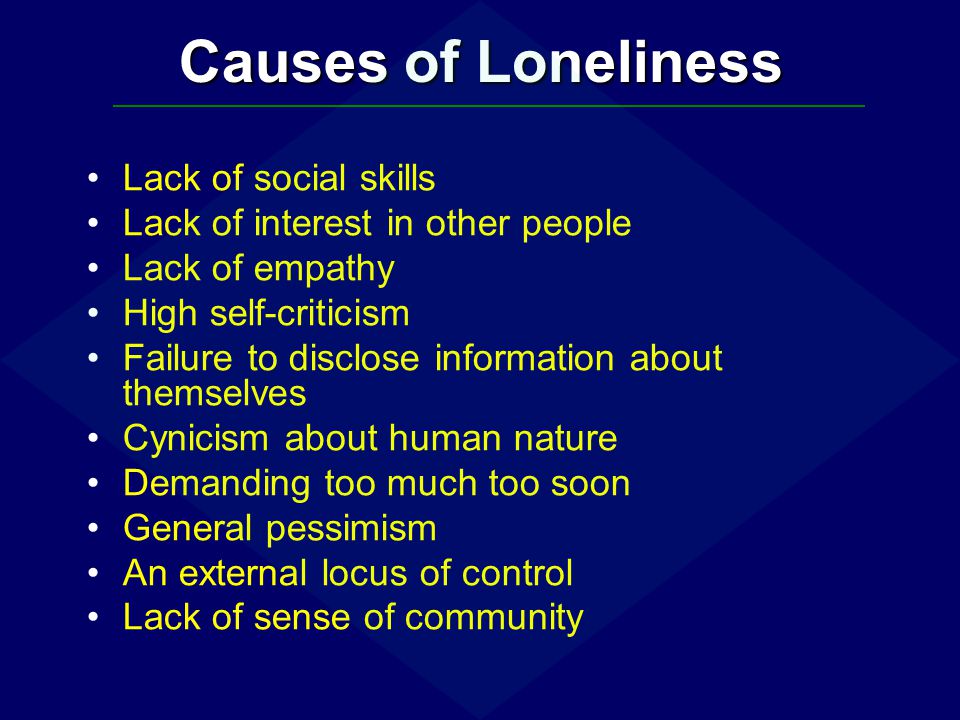 Or you may even feel that their reason for feeling sad isn’t serious enough to warrant these emotions. You may have difficulty seeing the situation from their perspective (cognitive empathy).
Or you may even feel that their reason for feeling sad isn’t serious enough to warrant these emotions. You may have difficulty seeing the situation from their perspective (cognitive empathy).
Because of this, you may not experience compassionate empathy.
Empathy exists on a spectrum, and in most cases, it isn’t entirely absent — it’s just diminished.
Because empathy is an ability, most people can develop it. Having low empathy doesn’t mean you’ll feel this way forever.
In some cases, due to illness or trauma, some people may have extremely low empathy and a diminished capacity to develop it. However, they still have the capacity.
Because everyone is different, and empathy is a spectrum, low empathy or lack of empathy can be challenging to spot.
In general, some of the signs someone may lack empathy include:
1. Being critical and judgmental
People who have low empathy may excessively criticize other people for experiencing or expressing emotions in certain scenarios.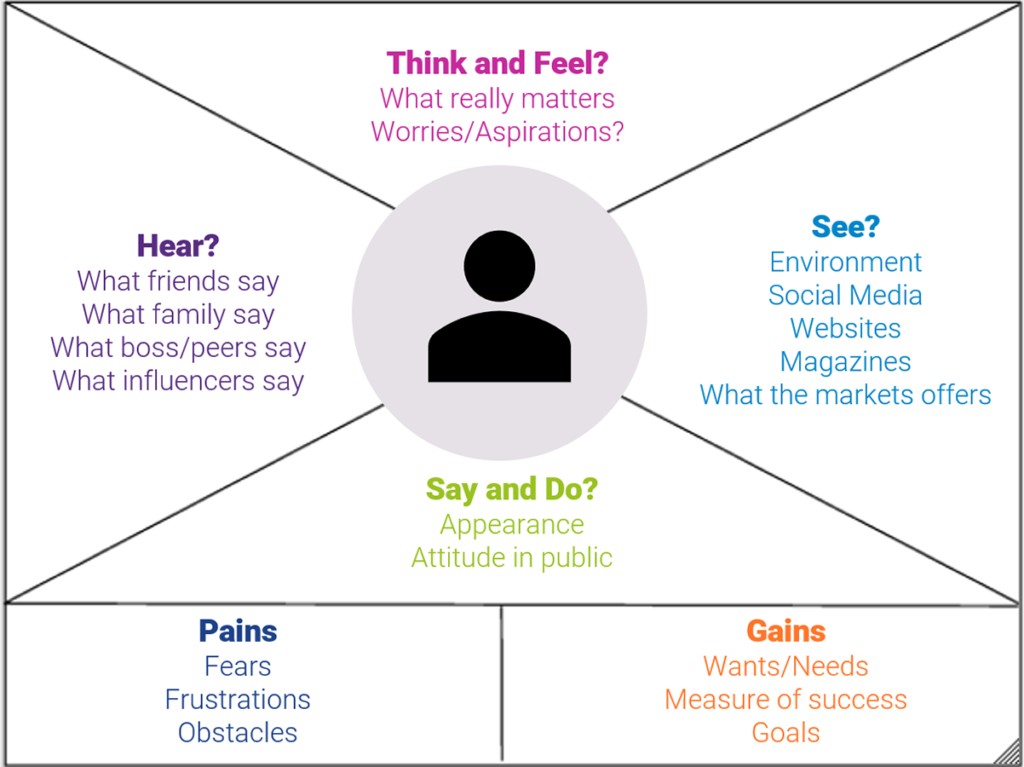
Someone with a lack of empathy may also blame the person for what they’re experiencing. For example, they may say things like, “If you didn’t do those things, you wouldn’t be in trouble now.”
Someone who isn’t empathetic may also label people or behaviors without considering the context. For example, they may criticize a colleague for being late, without realizing or appreciating that they have a sick child at home.
2. Thinking it wouldn’t happen to them
Someone with low empathy may have trouble connecting to other people’s circumstances.
They may believe that a certain event would never happen to them, or that they could handle the situation “much better.” Because they feel this is the case, they won’t be able to understand or feel the other person’s distress.
3. Calling other people ‘too sensitive’
Because they have difficulty understanding another person’s perspective and sensing their emotions, a person that lacks empathy will sometimes think emotional reactions are not valid, or they may act in dismissive ways.
They may think people’s feelings are optional or come from what they may perceive as an emotional deficit. “You’re feeling that way because you want to or because you’re too sensitive, not because it’s really that bad.”
4. Responding in inappropriate ways
Someone with low empathy may joke about someone’s emotions or circumstances. They may also have a difficult time actively listen to you. They could also act chirpy or indifferent after you just expressed feeling sad or stressed.
Someone who is empathetic might try to cheer you up if they see you down. But someone who isn’t may ignore how you feel altogether.
5. Having trouble understanding how their behavior affects others
Often, low empathy may result in a person not realizing that their actions can affect others. Other times, they may understand that their behavior impacts other people, but they may not feel remorseful about it.
This means that someone may act in selfish or vindictive ways without realizing or caring if that hurts you.
6. Difficulty maintaining relationships
Low empathy may lead to constant friction in relationships or a lack of meaningful bonds.
When someone has a difficult time understanding other people’s feelings or acting in helpful ways, they may end up with few or no meaningful connections. Sometimes, they’re not even aware this is happening.
Everyone may experience low empathy at times. For example, it may be natural to have difficulty feeling and expressing empathy toward someone who has harmed us.
There is some debate on whether a person is born with low empathy or if upbringing, social factors, or life experiences may hinder their ability to develop it, or even limit it. Genetics may also play a role.
Other possible factors associated with low empathy include:
Personality and developmental disorders
- narcissistic personality disorder (NPD)
- Machiavellianism
- sociopathy or antisocial personality disorder
- borderline personality disorder (BPD)
- alexithymia
- autism
Among these conditions, levels of empathy can vary.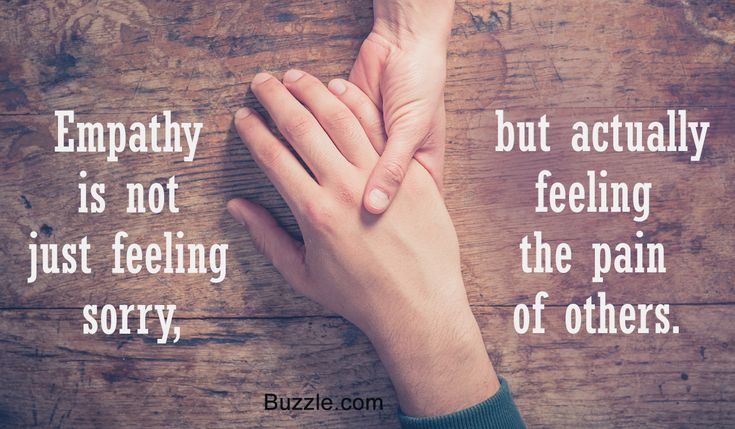 Among individuals, levels can vary even more so.
Among individuals, levels can vary even more so.
For example, research suggests that some people with BPD may have difficulty developing emotional empathy but may display cognitive empathy.
Machiavellianism (a personality trait) and NPD (a mental health condition) have long been associated with a lack of empathy. However, one study suggests that people with these traits and disorders actually have a certain degree of empathy — they just may lack the motivation to show or act on it.
Additionally, autistic people can sometimes have difficulties with cognitive empathy. However, they may develop emotional empathy but face challenges with expressing it. A 2018 study suggests that possible low empathy among autistic people is not related directly to the causes of autism but rather to the co-occurrence of alexithymia.
ModelingBecause empathy is partly a learned behavior, you may not be as empathetic if you didn’t experience much empathy while growing up.
Also, if you were alone much of the time, you may not have had the opportunity to practice empathy. This, too, can lead to a reduction of empathetic expression.
Low emotional intelligence, burnout, and stress
Emotional intelligence may be linked to empathy. If you haven’t developed this type of intelligence, you may also have low empathy.
Being under prolonged stress may also lead someone to be less tolerant of other people’s behavior and have lower cognitive empathy.
In some cases, emotional avoidance may also be a reason why someone may not develop or practice empathy. If someone is emotionally burned out, they may avoid all additional sources of distress, including relating to someone else’s difficulties.
In general, research also shows that some people may not develop compassionate empathy because of its perceived costs, like mental effort, time, and emotional weight.
Empathy can be developed. Here are a few tips for working on it:
Building cognitive empathyConsider asking questions whenever you feel you don’t understand what the other person feels:
- “How do you feel about this?”
- “What were you hoping for?”
- “Is there anything else going on in your life you may want to talk about?”
You could also work on being more observant of body language.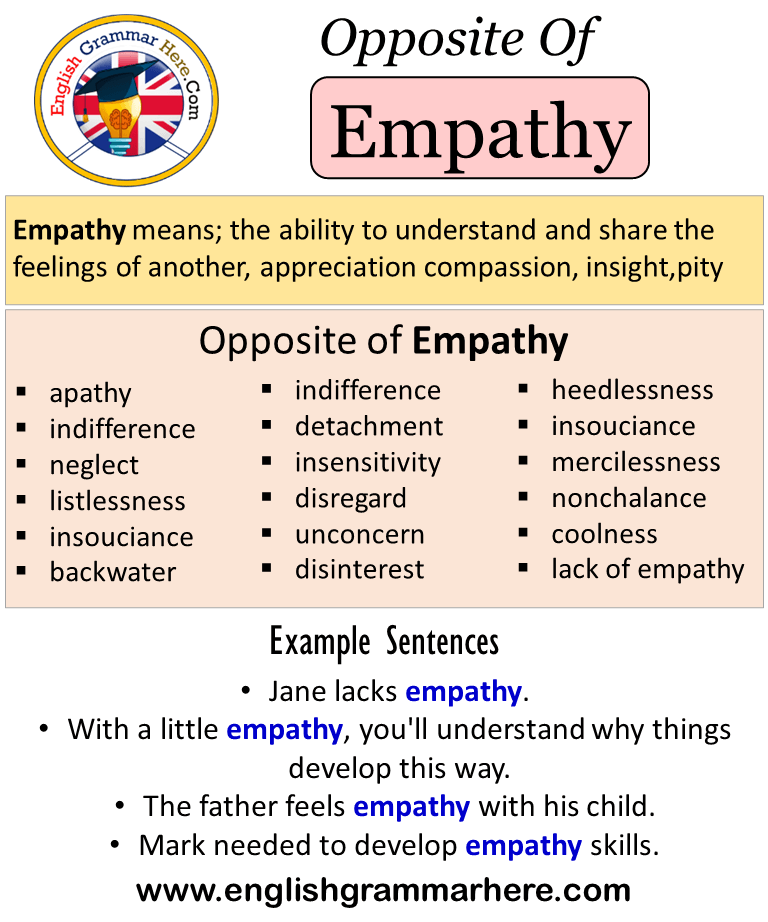 You may be able to tap into someone else’s emotions if you notice a change in their expressions. This may also include focusing on nonverbal cues like tone of voice and change in habits.
You may be able to tap into someone else’s emotions if you notice a change in their expressions. This may also include focusing on nonverbal cues like tone of voice and change in habits.
Learning more about what’s important to those around you may also help you notice when their mood changes, even if you don’t feel the same way they do.
For example, if you know this person cares a lot about their pet — even if you don’t like animals — you may understand why the loss of their companion is devastating to them.
Increasing emotional empathyWorking on recognizing your own emotions may help you connect with other people. Not everyone will recognize how they feel at all times or why they act in a certain way.
For example, you may act irritable and impatient today without realizing it’s because you’ve been sad about an argument you had yesterday.
Learning to connect your emotions with your actions may help you connect with other people’s emotions, too.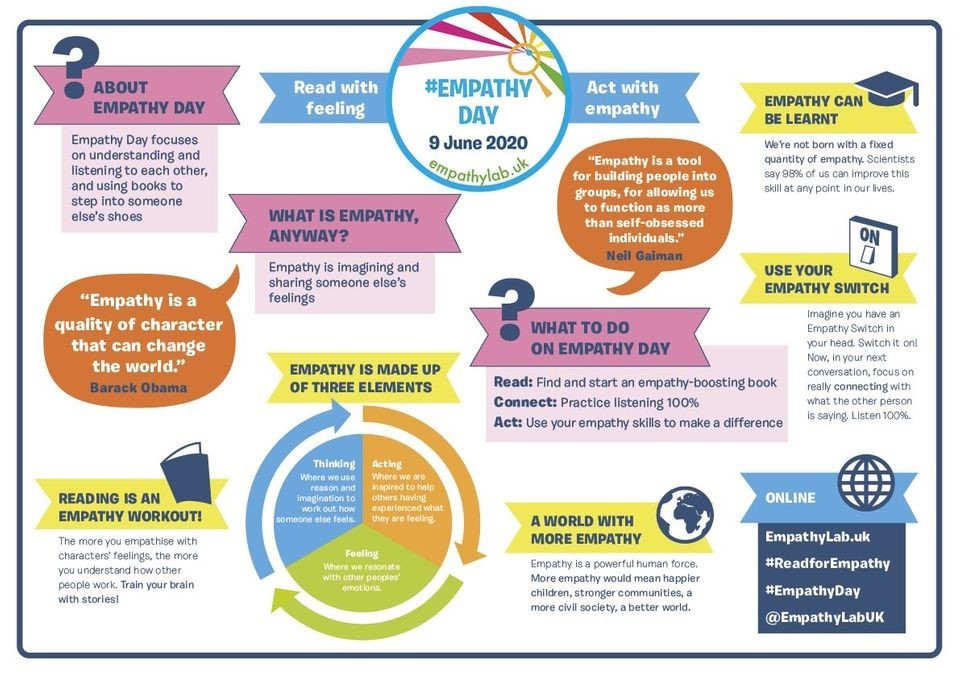
You could also practice listening more attentively and resisting the desire to tell the other person about your personal experience when they’re talking about themselves.
When you do, consider focusing on how they feel and why they may be feeling this way.
Enhancing compassionate empathyAs you develop both cognitive and emotional empathy, you’ll be more likely to have compassionate empathy and step into action when you see someone having a difficult time.
There are many types and levels of empathy. How much empathy you have depends on many factors, and may vary according to the situation.
Empathy may help you exhibit more helping behaviors and could also improve your relationships.
If you feel you could be more empathetic, you’ve taken the first step. Empathy is something you can develop, and it starts with awareness.
If you feel you’re having a challenging time developing empathy, you may want to seek the support of a mental health professional who can work with you in practicing a few techniques that may help.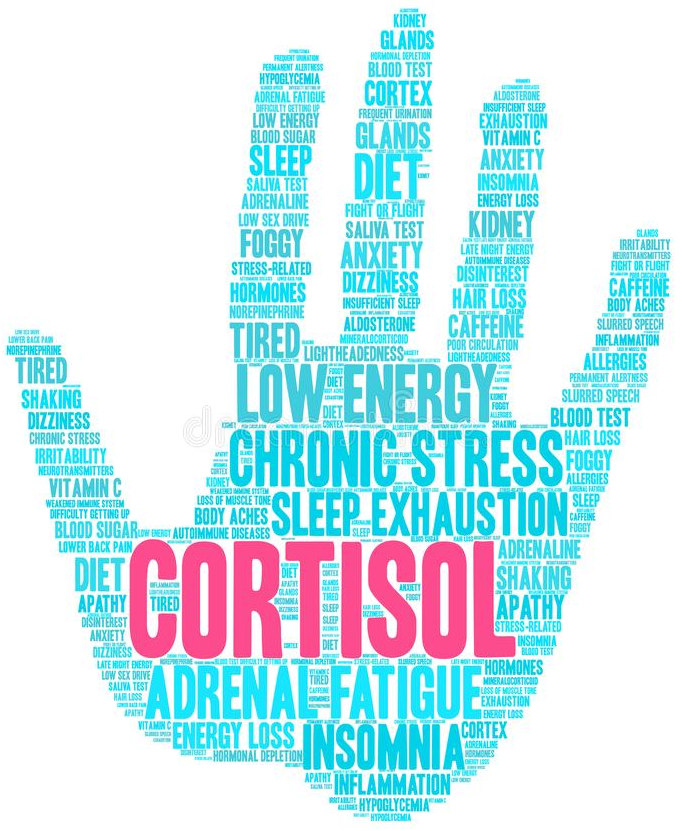
Characteristics Of People Who Lack Empathy, And How To Yourself
We are social creatures, and all have an innate desire to be connected to other human beings.
One of the primary requirements for this type of connection is empathy. This is what allows us to understand the experiences of others on an emotional level. If you don’t experience empathy from others, you can feel isolated and confused. If you don’t experience empathy for others, you can feel frustrated and come across as uncaring.
No one can be perfectly empathetic all the time. While being empathetic does come naturally to almost everyone to some extent, it also takes conscious and unconscious effort. We all succeed in being fairly empathetic much of the time. However, there are some people for whom empathy is severely lacking, and even some people who are almost completely incapable of expressing it.
Interacting with people who do not have empathy can be painful or even risky. Their behavior can be very selfish and inconsiderate, and it’s important to communicate clearly with them and set strong boundaries.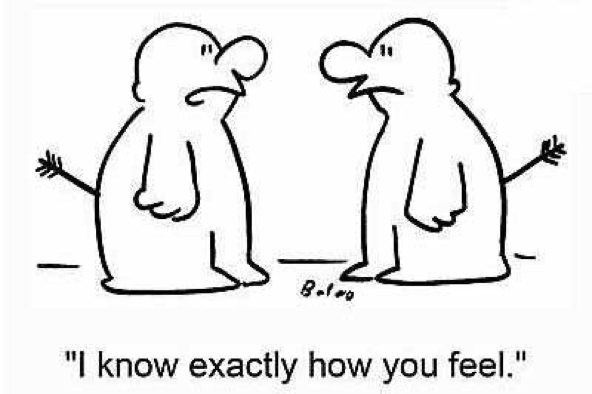 In this article, we’ll discuss what a lack of empathy looks like, the damage it can do, and how to keep yourself safe from it.
In this article, we’ll discuss what a lack of empathy looks like, the damage it can do, and how to keep yourself safe from it.
What Is Empathy
Wondering How A Lack of Empathy Can Affect Others?
Ask A Board-Certified Therapist.
The definition of empathy is fairly well established, but there is some controversy. The usual definition is the ability to understand someone else’s emotional experience. For example, if I tell you I am sad because I had a bad day, you can understand what sad means and how that is affecting me right now. It may lead you to appropriate actions in response, such as encouraging me or giving me a shoulder to cry on.
This is different than sympathy in that sympathy is often defined as actually experiencing the emotions others describe or display. For example, if you don’t just try to help me feel better in response to my sadness, but remember times you were sad and feel sad in response, you are exercising sympathy. Both empathy and sympathy have a similar result, i.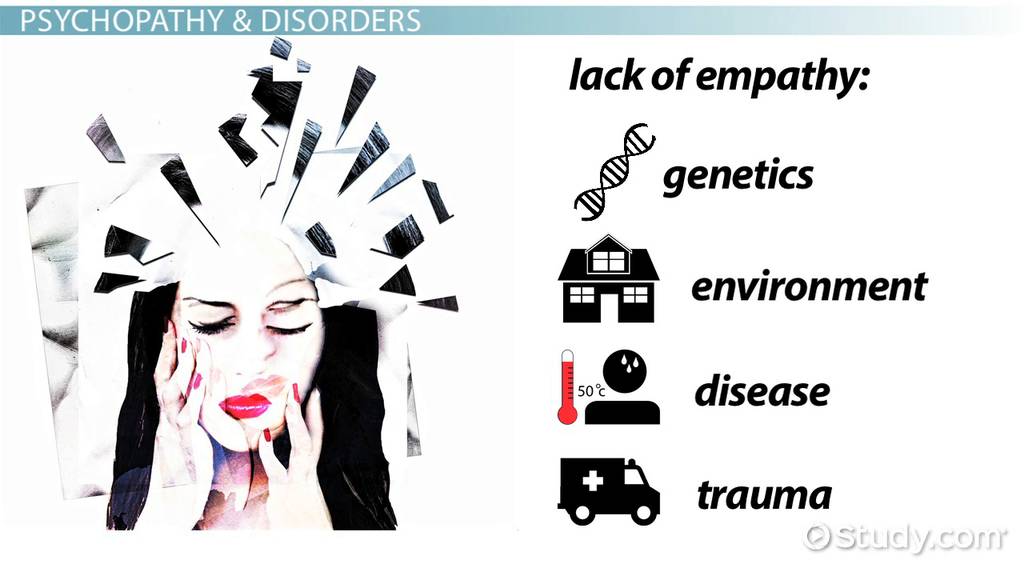 e., you trying to help me feel better, but they have different experiences in your brain.
e., you trying to help me feel better, but they have different experiences in your brain.
Some people define sympathy as merely a different type of empathy. For them, the definition above for sympathy is affective empathy, i.e., you are feeling, to some extent, what the other person is feeling. This is different from cognitive empathy, where you know what sadness is and understand your friend is feeling it, but don’t experience any sadness yourself.
Whatever definition you use, empathy is vital for connecting with other people. By putting ourselves in the other person’s shoes, we are more capable of becoming invested in the other person’s well-being. This is how friendships and relationships form.
It is also worth noting that empathy is a fundamental part of human psychology. It has been observed in rats and dogs, meaning it had existed in animal biology long before humans came along. It has even been tied to specific neurological pathways in the brain.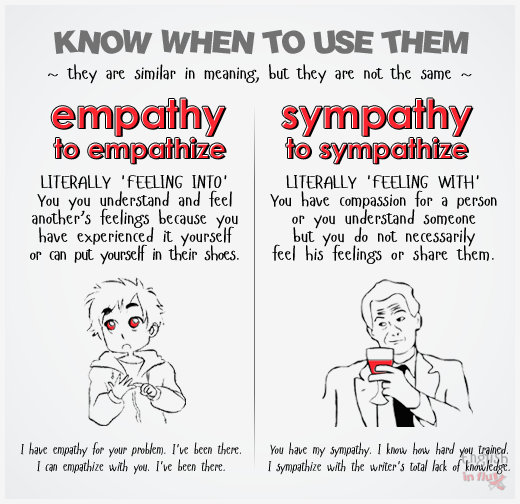 Thus, it is nearly universal in humankind. It is something that can, to some extent, be measured and recorded in neurology, and why your biology at least partially determines your ability to empathize.
Thus, it is nearly universal in humankind. It is something that can, to some extent, be measured and recorded in neurology, and why your biology at least partially determines your ability to empathize.
What Causes Empathy To Go Missing
To begin, we should be clear that empathy is a scale, not a binary issue. People can be more or less empathetic to one another, and people who struggle with it do not all struggle with it in the same way. You may be fairly empathetic much of the time but struggle to be patient in a particular area. For example, if doing complicated math equations comes naturally to you, it can be hard to work with others to take great effort patiently. However, not having empathy in this area does not mean you do not have empathy overall.
Just as there are different levels of empathy, there are different levels of lacking it. Some people may not have empathy in many areas but still have some in others. Imagine a coworker who has no patience for personal problems of any kind but expresses strong patience and understanding for professional issues.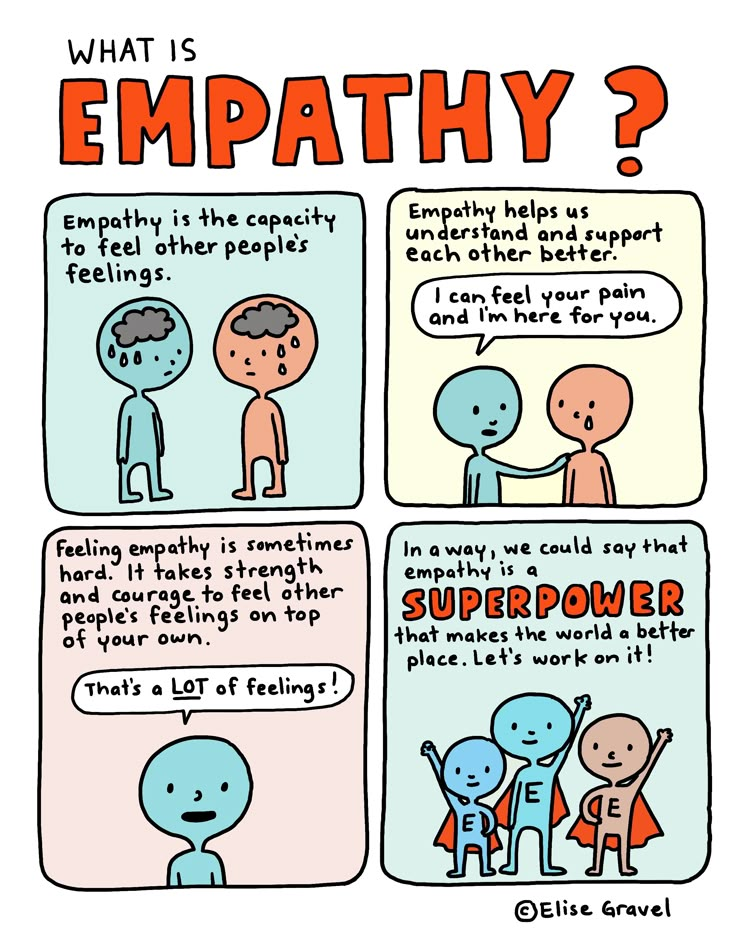 Some people may lack empathy across the board in a way that reduces the strength of their reaction, not their ability to react. If someone can be empathetic in almost all interactions but also come across as slightly distant, this may be because they lack strong empathy, but not all empathy.
Some people may lack empathy across the board in a way that reduces the strength of their reaction, not their ability to react. If someone can be empathetic in almost all interactions but also come across as slightly distant, this may be because they lack strong empathy, but not all empathy.
Further complicating things, empathy is both an ingrained and learned behavior. As mentioned, because empathy has a neurological component, it may be a physical problem if someone lacks it. However, not having empathy can also develop as a defense mechanism. If someone grows up in a troubled home or has had a hard life, it may have been advantageous to be emotionally distant.
Even more confusing, unempathetic behavior may have started with that person having a lower capacity for empathy at all, then grown over time in response to hard situations. Imagine someone who has a weak empathetic capacity from birth, and then that person is raised in a troubled home. This is to say that there is no one way for someone to lack empathy; it occurs in many forms and has many different ways to treat or manage.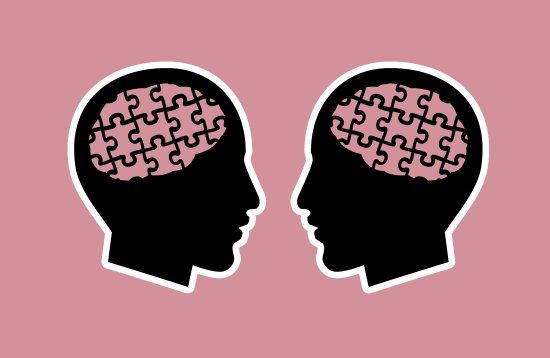
A minor caveat here: Not having empathy has many flavors, but being completely incapable of it is a distinct neurological condition. This condition also has degrees, but all of them are very challenging to manage. They are commonly known as a narcissistic personality disorder, sociopathy, and full-blown psychopathy.
Problems Lacking Empathy Can Cause
If you understand that empathy is an important component of how we relate to and connect, you can understand why not having empathy can be destructive. Here are some of the many ways that not having empathy can create problems for people who have this issue. All of them are good reasons to want to address poor empathetic behavior.
Isolation
Our ability to understand and perceive other’s emotional lives is how we understand some of the internal mental experiences of other people. On a subconscious level, this is vital to truly feel that you are not alone in the world, that other people are human beings with hopes, fears, and dreams just like you.
When that sense of understanding is gone, it’s profoundly isolating. If you lack empathy, it can seem like you are the only one with worthwhile emotional experiences. That makes it easy to feel that nothing and no one else matters. It can also feel like no one can truly understand and connect with you, leaving you feeling very alone.
Communication Problems
Put simply, if you can’t understand other people, it becomes much harder to talk to them. Empathy is crucial to know what to say, when to say it, and how. If you can’t empathize with people, every social interaction becomes much more difficult.
Trouble At Work
Interpersonal abilities are important in making friends and falling in love. They are also extremely important for professional success and stability, but it can be surprising how important those skills are. Some research suggests that emotional intelligence is even more important than IQ in being successful in life. Empathy is a core component of emotional intelligence and thus to our careers.
Empathy is a core component of emotional intelligence and thus to our careers.
Some may be surprised to learn that empathy is important for success. It can seem like some people achieve great personal success by acting with incredible selfishness. Indeed, some people learn to be selfish at work to get ahead. However, for the most part, self-absorbed people do not move ahead in their careers or personal relationships, and the success they do experience is superficial and easily undone.
Lower Physical Health
It will probably come as no great surprise that our need for belonging with others is more than just a feeling; it has physical origins. It is because it is such a deep part of who we are that not having it is damaging to more than just our feelings. Studies have shown that the issues of not having empathy can cause (poor communication, isolation) can lead to health problems.
How To Spot People Who Do Not Have Empathy
Empathy problems can be hard to identify confidently because of how complicated their source can be.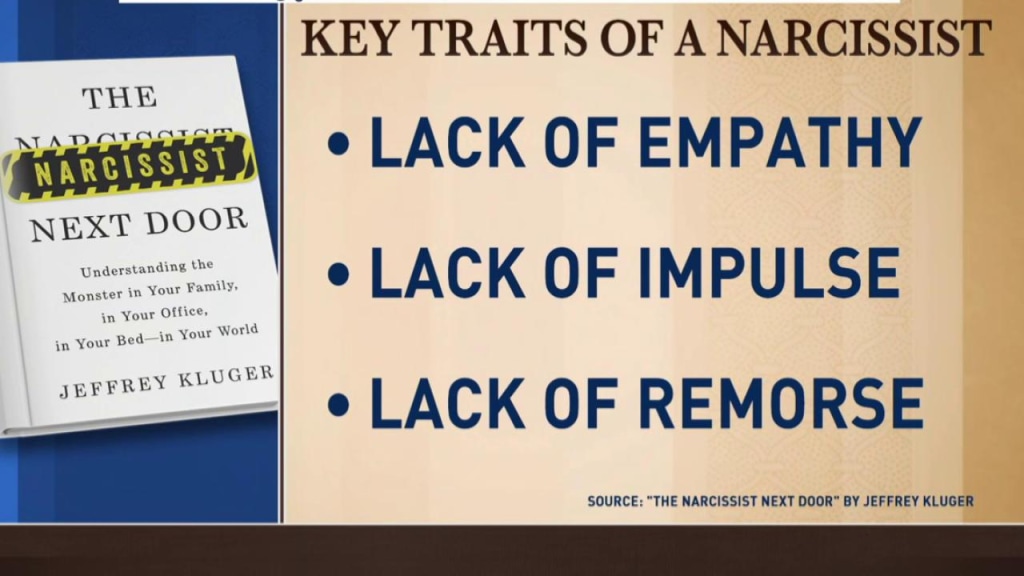 However, some things people do can be clear indicators of not having empathy and can lead you to start exploring taking action.
However, some things people do can be clear indicators of not having empathy and can lead you to start exploring taking action.
- Blaming others for mistakes
- Saying others are overly sensitive: We all do this sometimes, but people who do not empathize do it far more of the time in more situations.
- Refusing to hear other’s points of view
- Argumentative attitude
- Seems to struggle to understand where other people are coming from
- Can’t handle emotional situations
- Surprisingly emotional reactions: Typically manifests as strong reactions of frustration or even anger, rooted in their incomprehension of and impatience with other people’s feelings
- Difficulty maintaining relationships
How To Respond To Lacking Empathy
If you believe someone you know struggles with not having empathy, it is definitely worth your time to start addressing the problem.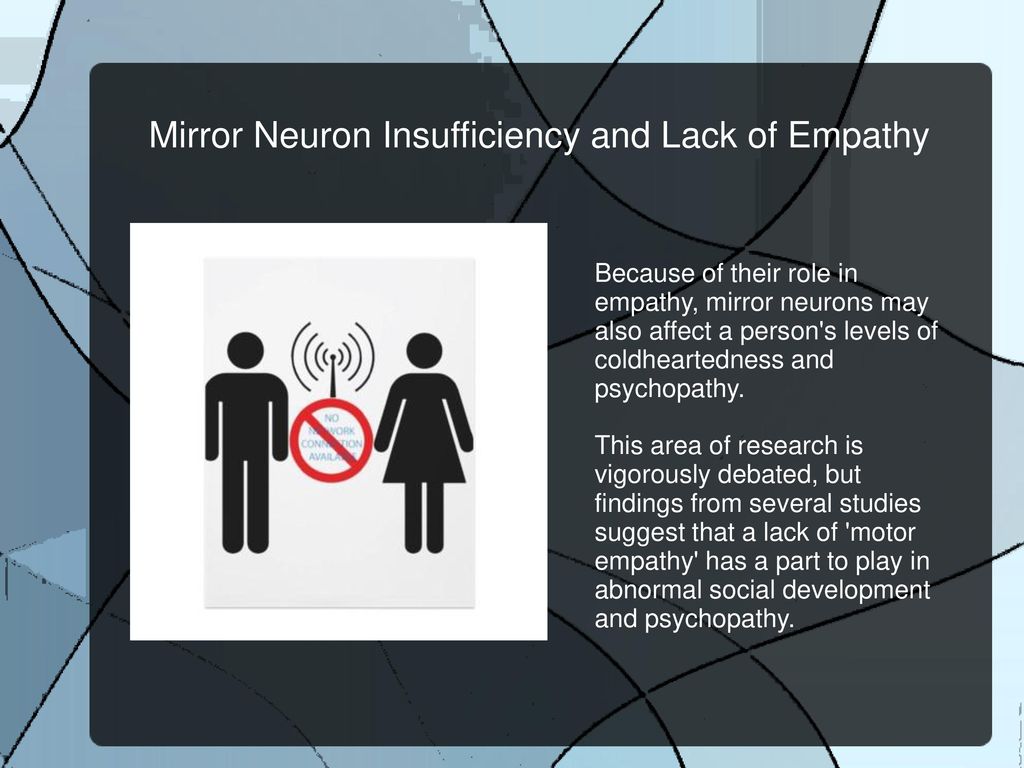 The complexity and patience required will vary depending on the source. Dealing with coworkers or random social connections lacking empathy is easier than dealing with close friends or loved ones. Nevertheless, there are tools for all situations.
The complexity and patience required will vary depending on the source. Dealing with coworkers or random social connections lacking empathy is easier than dealing with close friends or loved ones. Nevertheless, there are tools for all situations.
To begin, remember that the behavior is not necessarily based on evil intent. It may be born out of deep personal pain or trauma and addressing it will take patience and hard work on multiple levels. Making adjustments to emotional pathways takes weeks, if not months, instead of more surface-level behavior change.
Open Communication
Behaviors of not having empathy thrive in obscurity. If it’s something the person learned from a hard life, part of why it continues is because it is partly subconscious. There is also strong social pressure to ignore behaviors lacking in empathy. Many people worry about being too sensitive and say nothing even if their feelings are hurt. There is also a tendency to write off bad behavior as a quirky personality, e.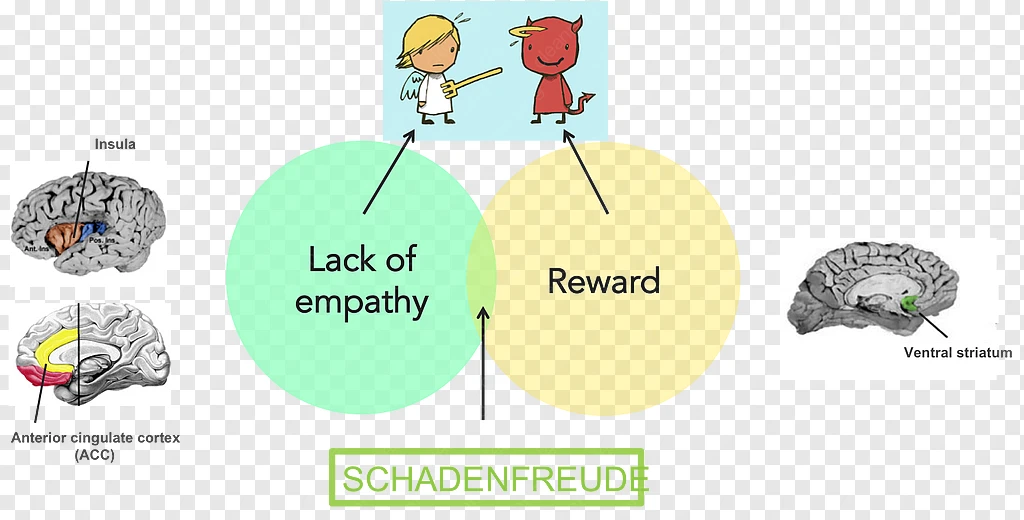 g., He’s not rude, that’s just the way he is, don’t take it personally.
g., He’s not rude, that’s just the way he is, don’t take it personally.
The solution to this is addressing it directly. If someone seems distant or even cold, speak up about it to the person. If they hurt your feelings, you have every right to let them know. The goal is not to make the other person feel bad. The goal is to assert the validity of your experience and work to find solutions.
Be Patient
As stated, the origins of this behavior are complicated, the source can be partly unconscious, and it takes practice to overcome. All of this means that even once you start calling people out for being unempathetic, you will have to give them time to adjust. It can take weeks or even months to make these changes, and they will likely never be as good at it as you imagine they should be.
Wondering How A Lack of Empathy Can Affect Others?
Ask A Board-Certified Therapist.
How patient you should be depends on the nature of your relationship. With a coworker, you can be direct and leave the responsibility for making the shift on them.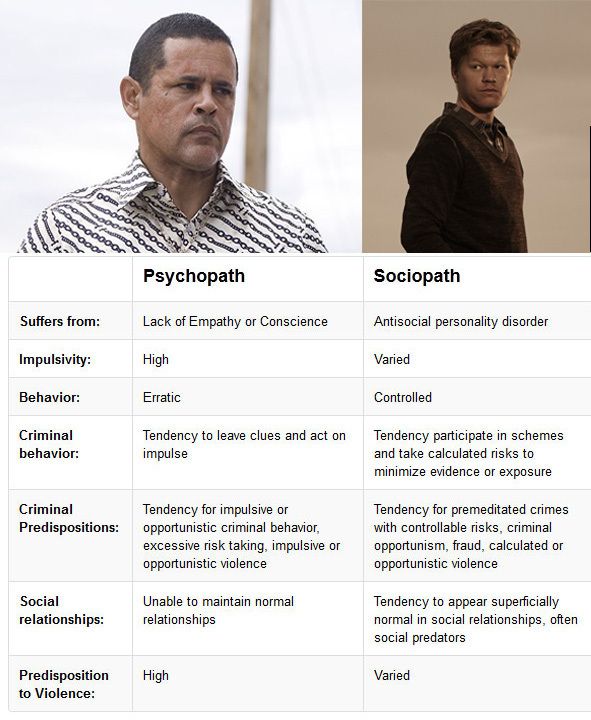 While you will likely have to remind them occasionally that it is not your responsibility to help them get there if they persist in negative interactions. Working with a loved one will be much more of a collaborative effort.
While you will likely have to remind them occasionally that it is not your responsibility to help them get there if they persist in negative interactions. Working with a loved one will be much more of a collaborative effort.
Set And Hold Boundaries
Healthily practicing open communication and patience will require healthy boundaries. Be direct and open about what you need and what you cannot tolerate. This is vital for two big reasons. One, people who lack empathy are not going to place those boundaries themselves. They struggle with emotional connection. If you don’t tell them where the lines are, they are not going to see them.
Two, and relatedly, people who lack empathy are going to push your boundaries. Because they can’t see the lines, they are going to charge over them. You should expect that when working with someone to improve their empathy, you will have to do more than show them your boundaries; you will have to defend them until they learn not to cross them actively.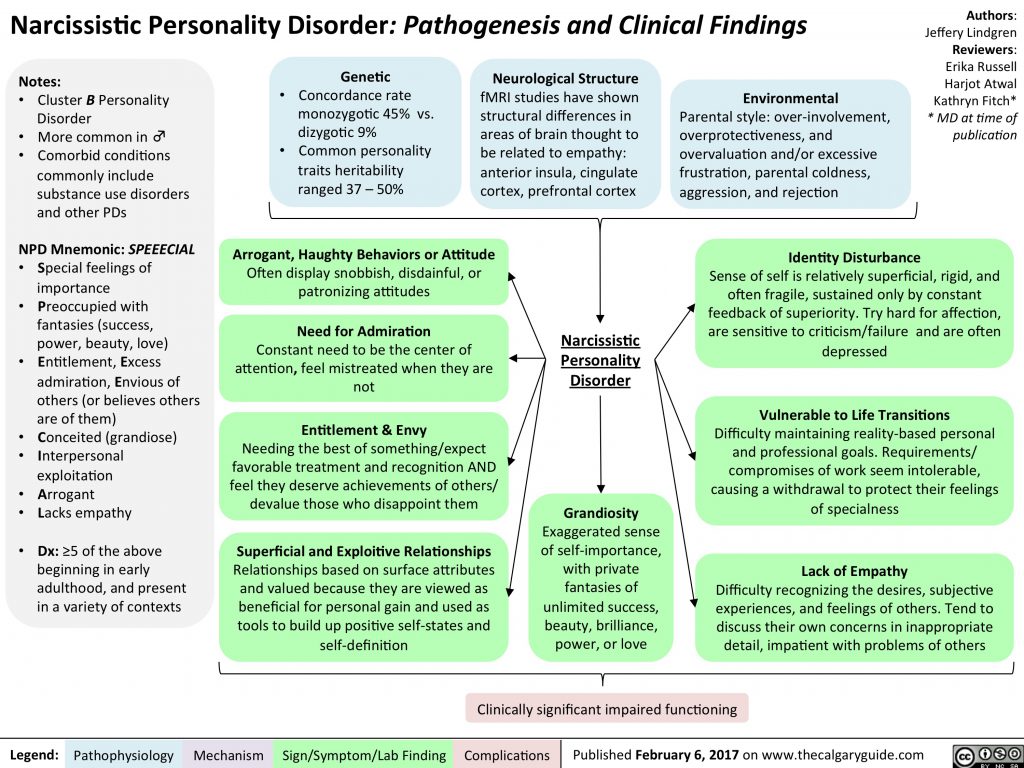
Be Willing To Walk Away
Some people don’t learn. Some relationships aren’t worth saving. Sometimes, even though the other person is trying, even though you want things to work, it can be just too painful to keep going. When someone is unempathetic, you must be prepared to shut things down if they don’t improve.
As we’ve discussed, there is great potential for pain when dealing with unempathetic people. This is especially true when you get into the people for whom it is a diagnosable psychological issue (e.g., sociopaths and psychopaths). It is not quitting to accept that a relationship is bad enough that it has to stop.
As with the other issues, this will depend on your relationship at the start. It can be extremely difficult for loved ones to end things over this issue, and you will likely put more time and energy into addressing it before you start thinking it can’t work. Conversely, with a new social connection, if you can spot a lack of empathy before things progress, it may be worth cutting them off right away.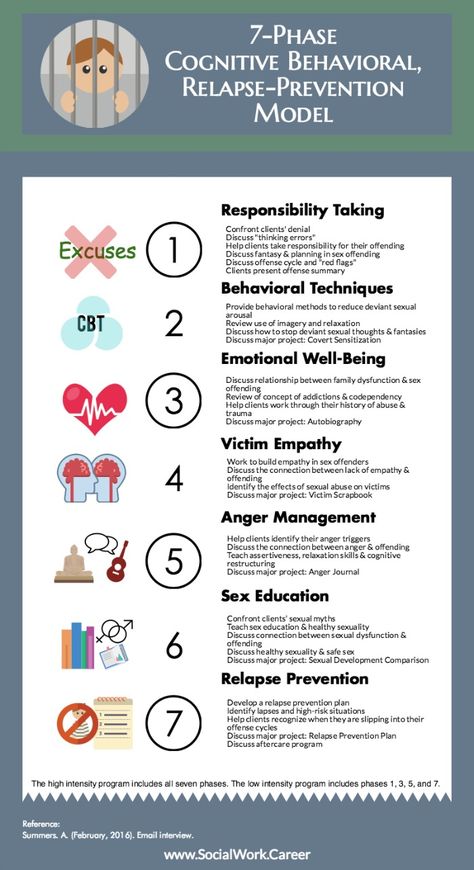
Not Having Empathy Is A Struggle For Everyone
Nobody likes feeling as though they “don’t get” other people. We all want to be understood and loved. Empathy, the ability to understand what is going on in someone else’s head, is a core component of our ability to connect. When other people lack it, connections become more difficult and more fraught. For the people who lack it, life is a greater challenge across the board.
As with any psychological issue, professional help in managing a lack of empathy in yourself or others is invaluable. A neutral third party with training can help you spot the warning signs, clearly identify the problem, and develop appropriate responses. Emotional interactions are hard enough to navigate when everyone gets along. Counselors like qualified professionals at ReGain can help you approach these challenges.
No one is perfect at empathy. You can’t be perfectly emotionally resonant with everyone you meet. But struggling with empathy occasionally is much different than lacking it in many circumstances. Understanding the origins of weak empathetic ability and the warnings signs for it in other’s behavior can save you a great deal of stress and turmoil.
Understanding the origins of weak empathetic ability and the warnings signs for it in other’s behavior can save you a great deal of stress and turmoil.
10 facts about empathy: Society Articles ➕1, 06/22/2020
The scientific concept of “empathy” is more than a hundred years old, but the term has come into fashion among personal growth consultants and business coaches in recent years. Developing empathy as an integral part of "emotional intelligence" is advised to bosses of any rank, politicians and marketers, as it will help them achieve their goals. Plus-one.ru has collected ten scientific facts about empathy, confirmed by scientific research.
Photo: iStock.com
Fact 1: Lack of empathy can be a sign of mental illness. Empathy is an emotional response, empathy for a communication partner. The term is a tracing-paper from the German Einfühlung, introduced in 1885 by Theodor Lipps when describing the impact of art on people.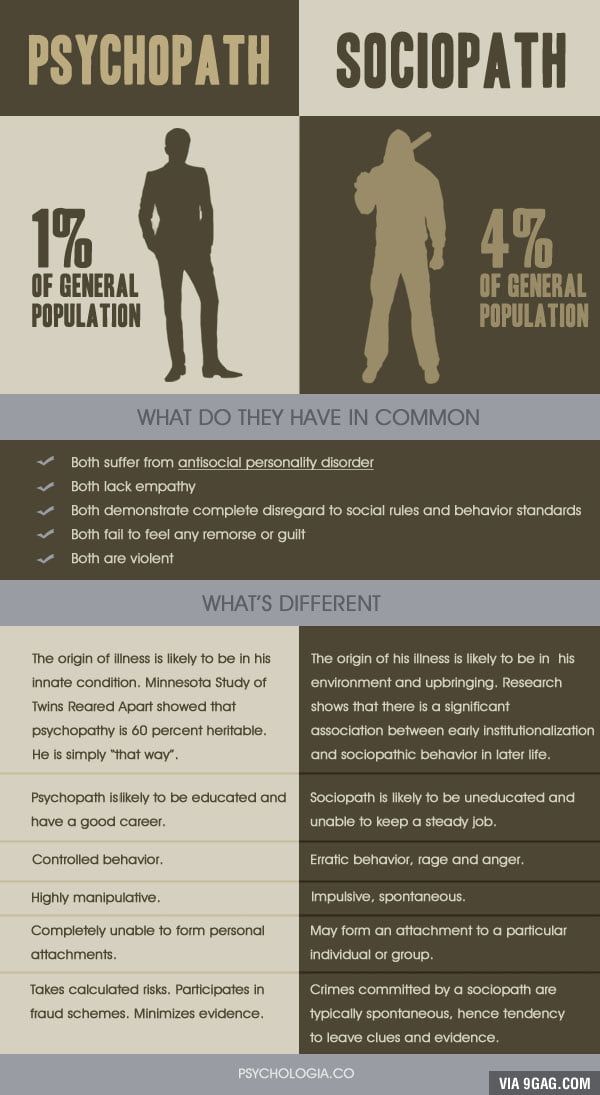
British psychologist Simon Baron-Cohen proposed a scale of empathy from zero (complete absence) to six (altruism). A complete lack of empathy is associated with various diseases (narcissistic personality disorder, psychopathy, and so on), and an excess of empathy, when a person is constantly focused on the feelings of other people, is commonly called altruism.
It is believed that a large number of people with a high level of empathy makes both people and entire societies virtuous. However, altruists themselves often face difficulties in building personal boundaries.
Fact 2. Empathy is innate and is associated with the work of mirror neurons . This is evidenced by the behavior of a baby who screams when he hears a baby crying from a nearby crib or copying the mother's emotions. This copying is an important part of growing up as a person “learns” emotions. Mirror neurons are involved in the neurophysiological mechanisms of empathy.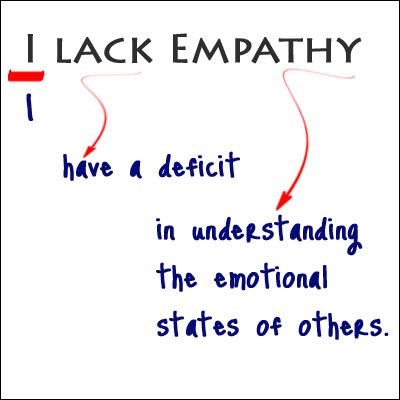 During the experiments, it was found that if a person is told about something vile, they excite the very neurons that are responsible for disgust, and if they talk about someone else's pain, the brain reacts as if the pain is experienced by its owner.
During the experiments, it was found that if a person is told about something vile, they excite the very neurons that are responsible for disgust, and if they talk about someone else's pain, the brain reacts as if the pain is experienced by its owner.
Fact 3. Empathy is not unique to humans. The Dutch primatologist Frans de Waal describes examples of helping behavior in animals in the book In Search of Humanity in Primates. Just like in humans, empathic (helping) behavior is based on experience. In a number of experiments, it has been proven that rats try to help their relatives in danger through which they themselves have passed. In the course of experiments at the Japanese Kansei Gakuin University, one rat sank into a tank of water, while the other had the opportunity to open the door of this tank in order to save her. Behind another door, there was a chocolate treat nearby. The second rat first saved the first, and then shared food with her.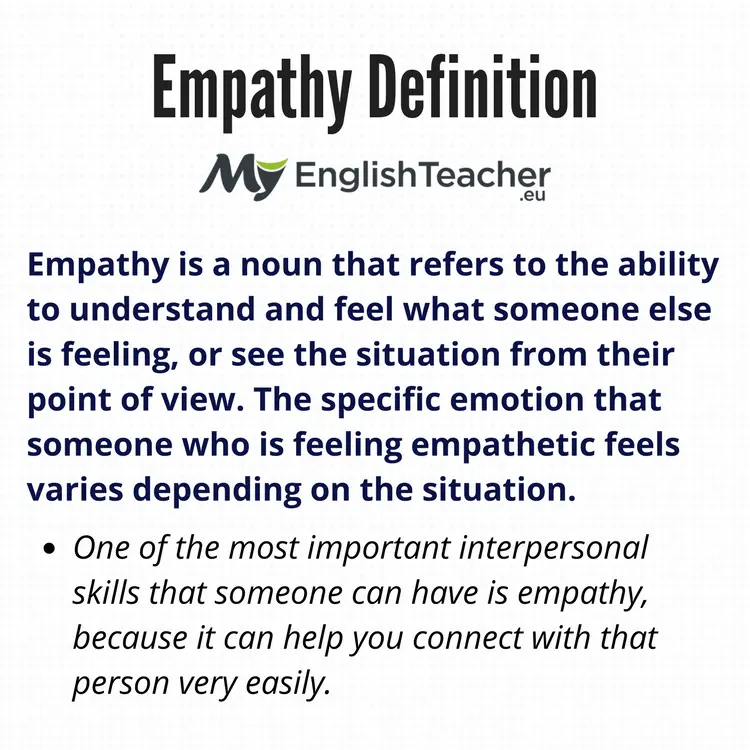 Those rats that were already drowning in a tank of water reacted faster than the others.
Those rats that were already drowning in a tank of water reacted faster than the others.
Fact 4. Empathy is only partially transmitted genetically. This was shown by a study at the University of Cambridge, in which 46,000 people took part: each test subject completed a survey and received an “empathy coefficient” as a result, and also passed saliva samples for a DNA test. In this experiment, scientists looked for differences in genes that could explain why some people are more empathetic than others. Experience has shown that only in 10% of cases the ability to empathize in humans is genetically determined. At the same time, scientists have not yet discovered a specific “empathy gene”. AT 90% empathy is a cultural product.
Fact 5: Women are more empathetic than men. Experiments by a group of scientists from the US, Italy and the UK show that women are more empathetic than men. However, this is due not so much to biological characteristics, but to cultural norms: gender attitudes, activities related to caring for loved ones.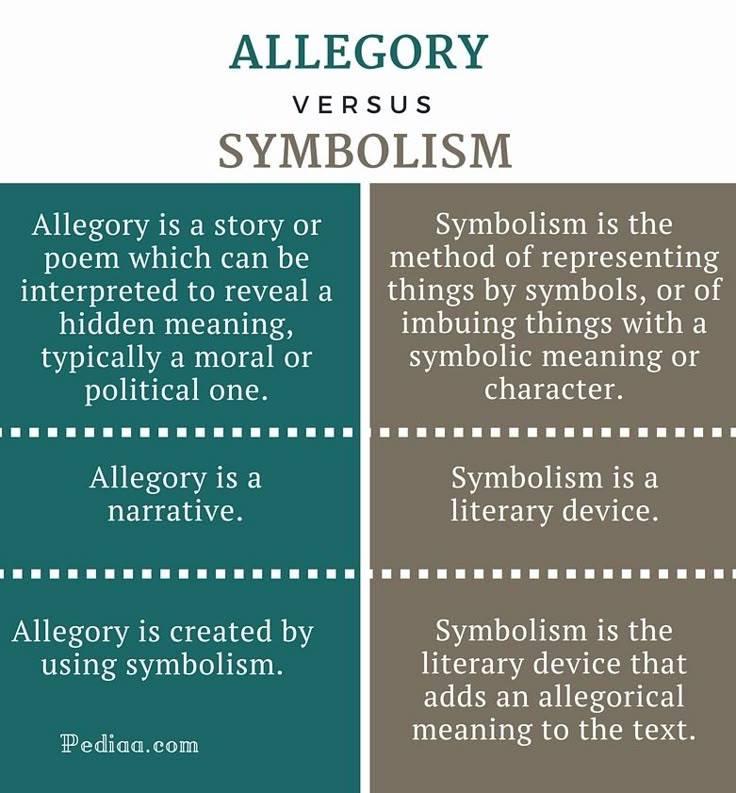
Empathy also has a number of "politically incorrect" properties: we are more willing to show it in relation to outwardly attractive people, as well as to people of our own race and nationality. At the same time, in multicultural societies with rich experience in combating xenophobia, this gap is not so clear.
Fact 6. The level of empathy is not constant. Changes depend on many circumstances: experience, state of mind, external factors, and so on. The famous experiment of Professor Stanley Milgram of Yale University proved that people are highly dependent on authorities for manifestations of empathy. As part of the experiment, participants were asked to inflict pain (shock) on another person (in reality, an actor). Despite their doubts, most of the participants agreed to gradually increase the current and cause suffering, as a “scientist” in a white coat stood nearby and encouraged them with the phrases: “Please continue”, “It is absolutely necessary that you continue”, and so on.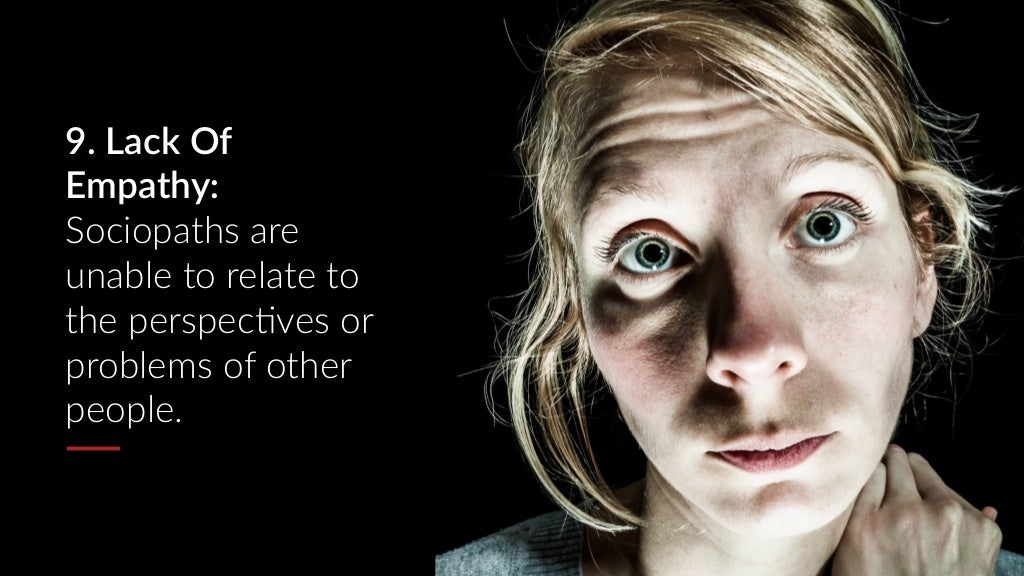 Of the 40 participants, 26 reached the end of the scale (when the suffering inflicted was the highest).
Of the 40 participants, 26 reached the end of the scale (when the suffering inflicted was the highest).
Subsequently, scientists repeated the Milgram experiment several times, and the results turned out to be close to the original ones. In particular, Jerry M. Burger repeated the experiment in 2009, changing several protocols in accordance with ethical requirements. During the experiment, participants could see how others refused to continue the experience, but even in this state, many obeyed the "doctors".
Fact 7. Reduced empathy does not lead to aggressive behavior. A study of several dozen violent offenders found reduced levels of empathy in perpetrators. Aggressive participants in the experiment had a decrease in empathic response to emotional videos of others suffering. However, in people suffering from narcissistic disorders and psychopathy, empathy can also be reduced, but they are not prone to violent actions.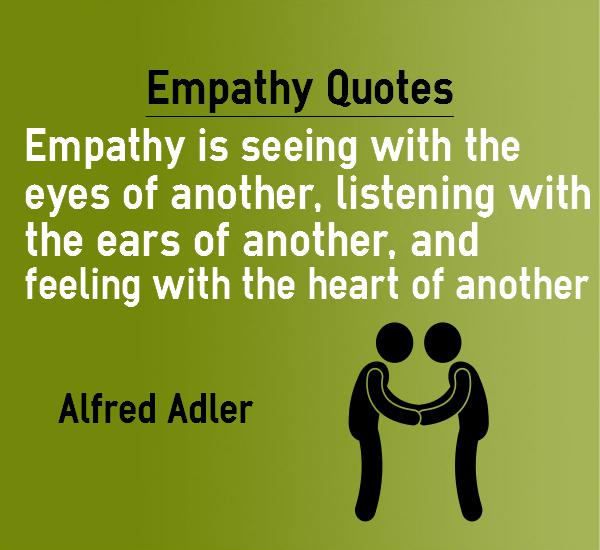 It turned out that the decrease in empathy in aggressive men was caused by alexithymia - the inability to describe one's own state, focusing on external events to the detriment of internal experiences, a tendency to utilitarian thinking with a deficit of emotional reactions.
It turned out that the decrease in empathy in aggressive men was caused by alexithymia - the inability to describe one's own state, focusing on external events to the detriment of internal experiences, a tendency to utilitarian thinking with a deficit of emotional reactions.
Fact 8. The bystander effect reduces empathy. Empathy tends to "dissipate": hence people's idea of "loneliness in a crowd", of the rigidity of city dwellers compared to village dwellers. Psychologists John Darley and Bibb Latane conducted an experiment they called the "witness effect": experimental students were taken to different rooms, where they were offered to listen to how an actor (students did not know that he was an actor) played out a scene of an epileptic seizure. If the participant in the experiment believed that he was the only witness of the "attack", the victim received help in 85% of cases, if the participants knew that there were two of them - in 62%, if they thought that there were five of them - only in 31% of cases.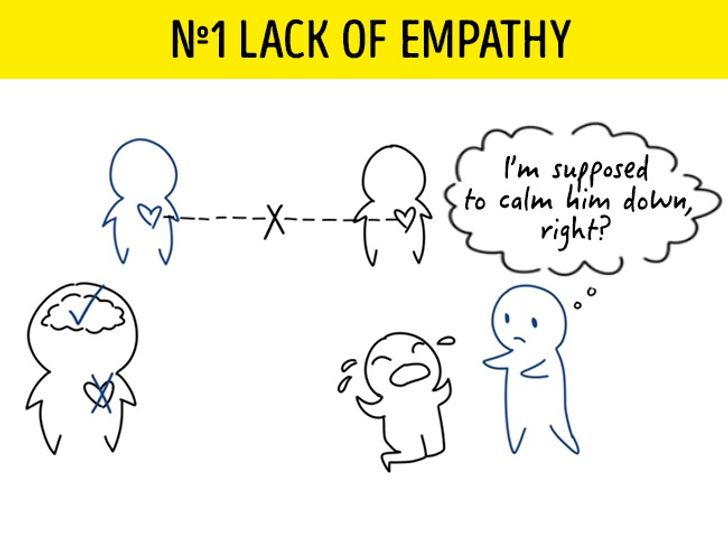 Scientists have called this effect “responsibility diffusion”.
Scientists have called this effect “responsibility diffusion”.
Fact 9. Empathy helps you be more successful. In modern business, empathy has become an important element of management. A joint study on the psychology of hedge fund managers by researchers at the University of Denver and the University of California at Berkeley found that people with reduced empathy and pronounced psychopathic traits are more successful in name than in deed. Ruthlessness and callousness in the modern world help business less. Psychopaths often cause chaos in the workplace, their actions lead to staff drain and reduced employee productivity.
Fact 10. Empathy and happiness are related. Happy people tend to be more altruistic and empathetic than unhappy people. Child behavior researchers have found that children who are often punished are less generous than those who are not punished at all or rarely punished. At the same time, helping others improves bad moods and prolongs good ones. Charles Darwin argued that we ourselves need empathy in order to live in harmony with our conscience: “If we, under the influence of selfishness, do not follow the desire to help our neighbor, then later, when we vividly imagine the disaster we are experiencing, the desire to help will arise again and its dissatisfaction will cause in us painful pangs of conscience.
At the same time, helping others improves bad moods and prolongs good ones. Charles Darwin argued that we ourselves need empathy in order to live in harmony with our conscience: “If we, under the influence of selfishness, do not follow the desire to help our neighbor, then later, when we vividly imagine the disaster we are experiencing, the desire to help will arise again and its dissatisfaction will cause in us painful pangs of conscience.
Author
Ekaterina Drankina
(Not) sympathize: determine your type of empathy
(Not) sympathize: determine your type of empathy
Empathic people are able to respond to other people's feelings, empathize with them, form strong connections, and be aware of their own emotions. Human beings are empathic by nature. However, some empathize with their hearts, others with their heads, some practically do not feel other people. T&P have compiled a test that can determine your type of empathy.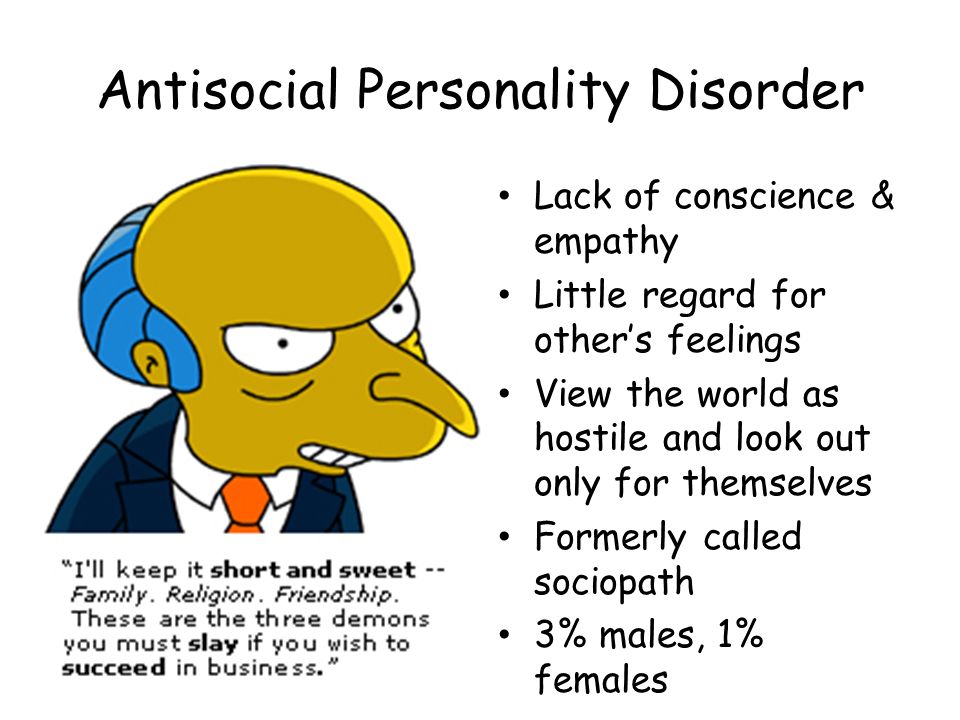
Start test
1/10
If I see a person who is very upset or crying, it hurts me too
Yes, it is. I feel almost the same as him, and I feel myself in his place It’s hard for me to feel the pain of another I not only feel his pain, but I can imagine and understand what feelings he will experience later I worry about this person and understand his pain, but I don’t feel it on myself
2/10
If someone is nervous, this state is easily transmitted to me
Yes, I quickly become infected with anxiety and I feel it just like others I see and understand that other people are nervous, but I do not immediately get this state I do not always notice that others are nervous I feel this tension and understand how it will change mood of others
3/10
I often feel that something is wrong with a person close to me, even at a distance
I live this state with him and I can predict what emotions we will experience later Yes, I don’t even know I need explanations, I am immediately conveyed his condition I understand that something happened to a loved one, but still, without explanations, it is difficult to realize what state he is in Unfortunately, without explanations, I will not even notice this
4/10
I experience strong emotions when watching a movie or reading a fiction book and often feel for the characters
I see the characters' experiences and observe them, but I don't always feel them. It's just a movie, just a book. Characters are fictitious, coincidences are random I understand the feelings of the characters and I know what they will experience in this or that situation Yes, I definitely feel everything and transfer it to my life
It's just a movie, just a book. Characters are fictitious, coincidences are random I understand the feelings of the characters and I know what they will experience in this or that situation Yes, I definitely feel everything and transfer it to my life
5/10
When I make a decision that affects other people, I am very worried about how it will affect them
I understand that my decision has consequences, but emotionally I do not empathize No, I do not care about others and focus only on my decision Yes, it is difficult for me to predict how they will feel, but I feel that I am responsible for others I feel
6/10
I often feel embarrassed if a friend tells me about his problems
I know how my friend will feel if the problem is not decide Yes, it’s really embarrassing, it’s not easy for me to listen to other people’s problems No, I immediately begin to worry about my friend I’m always ready to listen and find ways to solve a problem, look at it from the outside
7/10
Someone else's laughter is contagious
Not really, you still need to understand why they laugh No, it's not contagious! Yes! I don’t even always understand why others laugh, but I start laughing myself.